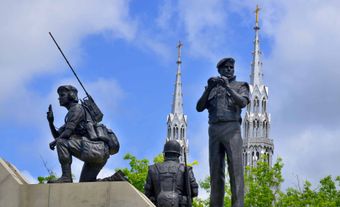Cet article a été initialement publié dans le magazine Macleans (17/04/1995)
The high costs of a Russian war to regain control over a rebellious region are starkly apparent in the shattered streets of the Chechen capital of Grozny. Once a leafy, provincial city of some 400,000 people, Grozny is now a devastated prize that more than lives down to its name - which in Russian means "terrible." Two months after Russian soldiers forced out boyviki (fighters) loyal to Chechen leader Dzhokar Dudayev, Grozny is indeed a wreck of a place, populated by shell-shocked survivors picking their way slowly through the ruins. Russian military commanders, aid workers and local authorities - all of whom are laboring to supply food, clean water and power to the city - guess that about 50,000 former refugees have straggled back to join some 75,000 others who survived the siege by cramming into dark, dank cellars. Those who fled and those who stayed are united in their despair over a war that has claimed the lives of as many as 25,000 civilians. Said Klara Kataoya, a 55-year-old Chechen: "They said in Moscow that they wanted to save us from Dudayev's criminal regime. But the Russians have done nothing here except turn the city into a desert."
Kataoya is now struggling to care for her invalid husband and 14-year-old son in an apartment all but destroyed in the fighting, which was fiercest in the neighborhoods around Dudayev's presidential palace. When the first Russian shells began falling on the area, in December, she and her family sought refuge 75 km to the south, with relatives in the mountains bordering neighboring Georgia. But the family recently returned in hopes of finding more food in Russian-occupied Grozny. Lamented Kataoya: "We were wrong. There were more relief organizations distributing humanitarian aid in the mountains than there are here. And there are only a few places in the city where we can get clean water." Unlike many of Grozny's inhabitants, however, Kataoya has not lost her sanity and sense of humor. She teased a reporter who was taking pictures of her son by asking: "When will the snapshots be ready for us?" And she clearly enjoyed correcting an initial misapprehension that her son's first name had Chechen origins. "No," she insisted, "I named him Aznavour after my favorite French singer and actor, Charles Aznavour."
Such lighthearted encounters are rare in a city marked by the cheap ironies of war. Huge Soviet-era murals proclaiming peace and brotherhood are still legible on walls of apartment buildings - now heavily scarred by Russian artillery fire. And in a square dedicated to friendship, another middle-aged woman, of Russian descent, wandered near the shell-pocked statues. Speaking in a clear, thin voice, she obsessively recounted her academic achievements to passers-by who displayed no interest in her story. Though still neatly dressed, the former oil industry engineer had clearly been profoundly disturbed by the harrowing experience of living in a cellar under shell fire. "We are all members of the intelligentsia in my family," she repeatedly asserted. "How can this have happened to me?"
Nearby, oblivious to her plight, other Russians rolled past in an envelope of noise and dust - interior ministry troops perched atop armored personnel carriers with protruding snout-like bows. In a city where the population at times seems to be composed entirely of children and the elderly, those young Russian soldiers were especially conspicuous. When the city fell to federal forces in early February, many Chechen males in their teens and 20s slipped away to nearby villages, commuting between civilian life and the small, mobile groups of fighters who continue to resist the 40,000-strong Russian force. Said Irena Raicevic, 36, a Russian-speaking linguist from Montreal who is serving as a Red Cross representative in Chechnya: "You see those guys driving around the villages with green flags on their cars. The flags are a sign of support for Dudayev, but they are also an invitation to the Russians to shell them."
During daylight hours, at least, Grozny is ruled by young Russians who at times resemble a parent's worst nightmare: armed joyriding youths who speed around town in military vehicles, their army uniforms supplemented by mirrored sunglasses, headbands, bandannas and running shoes. Another important war-zone accessory is the portable cassette player. With the thump of artillery rounds hitting nearby villages clearly audible in Grozny, bootlegged tapes of Roxette and other Western pop groups give the war a rock 'n' roll flavor - a loud, persistent beat that eases the tension and boredom of checkpoint duty for many soldiers in a nasty internal war.
The daytime bravado fades, however, as Chechen snipers take advantage of nightfall to slip across the vaguely defined front lines and bring the war back to Grozny. Said Sergei Korotkov, a 20-year-old driver of a Russian armored personnel carrier: "I can't wait to get out of here. It makes me sad to look at blown-up stores and the signs scrawled on apartment buildings - 'Peaceful people live here.' " Added the St. Petersburg resident: "The Chechens want revenge."
In a farmhouse just outside the city, a Chechen man only a year older than Korotkov expressed a similar view, arguing that increasing Russian control over a region that is roughly twice the size of Prince Edward Island would not mean an end to the war. "There are 150 million Russians and only about one million Chechens," said the man, a wiry, bearded figure in the black jeans and shirt favored by many pro-Dudayev fighters. "Even though they are pushing us into the mountains, we will never give up." Considering that Russians have been fighting in the Caucasus for hundreds of years, that remark is both a bleak reminder of a bloody past and a prediction of an equally grim future.
Maclean's April 17, 1995

 Partager sur Facebook
Partager sur Facebook Partager sur X
Partager sur X Partager par Email
Partager par Email Partager sur Google Classroom
Partager sur Google Classroom


